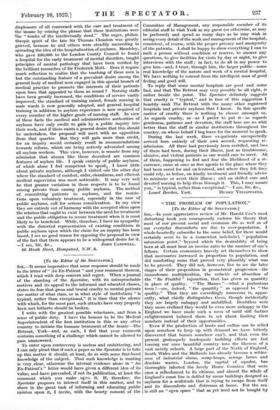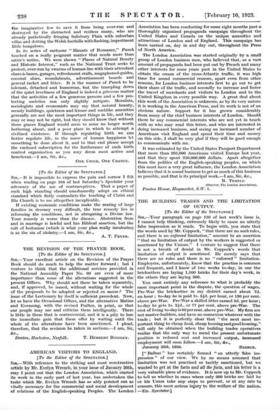" THE PROBLEM OF POPULATION."
[To the Editor of the SPECTATOR.]
Sra,—In your appreciative review of Mr. Harold Cox's most disturbing book you courageously endorse his theory that most of our present social and economic ills as well as of our everyday discomforts are due to over-population. I whole-heartedly subscribe to the same belief, for there would certainly seem to be a (somewhat indefinite) " population saturation point," beyond which the desirability of being born at all must bear an inverse ratio to the number of one's felloits. Certain economists bravely set themselves to show that necessaries increased in proportion to population, and did comforting sums that proved very plausibly what was to be proved. They did not, however, live to see the later stages of their proposition in geometrical progression—the immoderate multiplication, the reductio ad absurdum of the " Be Fruitful " injunction, that has given us quantity in place of quality. " The Masses "—what a portentous term !—are, indeed, " the quantity " as opposed to " the quality." That they are exceedingly numerous is, appar- ently, what chiefly distinguishes them, though incidentally they are largely unhappy and unfulfilled. Doubtless were they more civilized they would be even more unhappy in the England we have made such a mess of until still further enlightenment induced them to set about limiting their numbers instead of their opportunities.
Even if the production of boots and coffins can be relied upon somehow to keep up with demand we have ' bitterly discovered that houses somehow can't, and that even the present grotesquely inadequate ' building efforts are fast turning our once beautiful country into the likeness of a vast untidy suburb. A large part of the North of England, South Wales and the Midlands has already become a wilder- ness of industrial slums, scrap-heaps, sewage farms and desolate wastes. London, the capital of squalor, has thoroughly infected the lovely Home Counties that were
once a refreshment to its citizens, and almost the whole of England's coast line is defiled by mean buildings designed as asylums for a multitude that is trying to escape from itself and its discomforts and distresses at home. For the sea is still an " open space " that as yet need not be bought by
the imaginative few to save it from being over-run and destroyed by the distracted and restless many, who are already pathetically fringing Salisbury Plain with suburban villas and dotting the Welsh foothills with flashing, impertinent little bungalows.
In its series of cartoons " Haunts of Romance," Punch touched on a really poignant matter that needs more than satire's notice. We were shown " Places of Natural Beauty and Historic Interest," such as the National Trust seeks to protect, over-run by swarms of human lice with their attendant chars-à-banes, garages, refreshment stalls, megaphoned-guides, coconut shies, roundabouts, advertisement boards and general racket and litter. It is the manner of Punch to be .tolerant, detached and humorous, but the trampling down of the quiet loveliness of England is indeed a grievous matter that the activities of a few generous persons and a few pro- tecting societies can only slightly mitigate. Moralists, sociologists and economists may say that natural beauty, seemly buildings, quietness and leisure and suchlike amenities generally are not the most important things in life, and they may or may not be right, but they should know that without these graces England would seem to some no longer worth bothering about, and a poor place in which to attempt a civilized existence. If through regulating birth we can better regulate life, in the name of human happiness let something be done about it, and to that end please accept the enclosed subscription for the furtherance of such birth control organization as you may deem most active and beneficent. —I am, Sir, &c.,
ONE Cann, ONE CHANCE.



































































 Previous page
Previous page